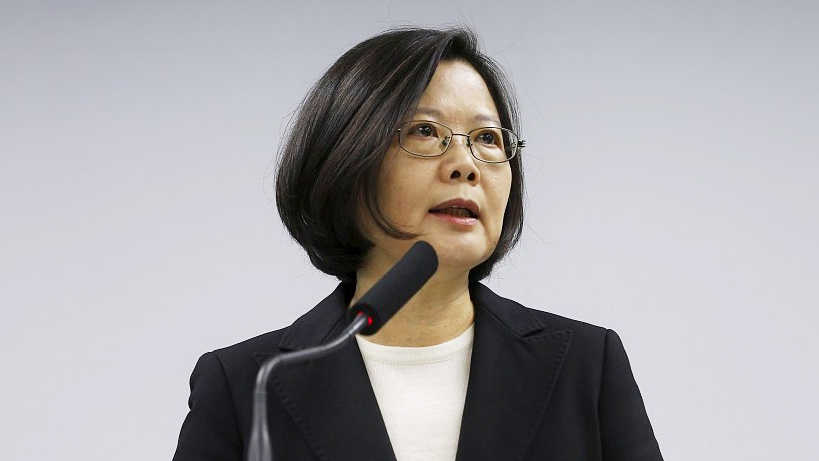
Editor's note: Zhang Hua is an associate research fellow at the Institute of Taiwan Studies under the Chinese Academy of Social Sciences. The article reflects the author's views and not necessarily those of CGTN.
As the world prepares to celebrate the New Year, Taiwan is being shrouded in "white terror." On December 31, the Democratic Progressive Party (DPP) took advantage of its dominance in the legislature and passed the highly controversial "Anti-infiltration Act" on the last day of the term of its incumbent leader.
It took only 34 days for the bill to go from being introduced by the DPP on November 27 to its adoption on December 31, which is unprecedentedly fast in Taiwan's legislative process.
The legislative process in Taiwan, like in many Western countries and regions, usually lasts for months or even years. However, in the past 34 days, only one legislative hearing and two "cross-caucus negotiations" were held. During the negotiations, little consensus was reached, and the process ended in a nasty fallout.
On November 29, the DPP wantonly altered the standard protocol in the legislature by bypassing the legislative committee's review process and moving the bill through a second reading, which severely violated the procedural justice of the legislature. More importantly, for a law concerning the legal liability of 23 million people in Taiwan, public opinion was not heeded during the legislative process, which seriously violated the basic democratic principle that "legislative power rests with the people."
Meanwhile, the content of the "Anti-infiltration Act" is vague.
The Act has a total of 12 articles. Article 1 states the legislative purpose, and Article 12 specifies the date of enactment. Article 2 explains such concepts as "foreign hostile force" and "infiltration source" and Articles 3-5 elaborate on the so-called "infiltration" scenarios. Articles 8-10 set out the targets of penalties and mitigating circumstances. Article 11 provides the duties of various Taiwan departments. In Taiwan, an act often contains dozens or even hundreds of articles. Thus, in comparison, this act is definitely short.

Taiwan leader Tsai Ing-wen.
Taiwan leader Tsai Ing-wen.
In addition, the law uses a lot of political language and ambiguous concepts. For example, the key terms used to define penalties in the legal text such as "foreign hostile forces," "infiltration" and "instructions" are highly political.
Rough and ambiguous legal provisions mean that the public can easily be charged under the law when it gives law enforcement too much discretionary power, as was the case in the 1950s – the white terror age in Taiwan.
Moreover, the "Anti-infiltration Act" is legislated out of political consideration. The purpose of the legislation should be to prevent and punish crime, but this law is teeming with political calculations.
The people on the island generally believe that there is no so-called "infiltration" problem in Taiwan. When the New Power Party, a radical pro-independence group, previously floated a similar bill, the DPP thought as most people did. Why did the DPP suddenly make such a U-turn before the Taiwan regional election?
Based on the provisions of the law, the five scenarios of "infiltration" listed in the act have already been addressed in the regional "Presidential and Vice Presidential Election and Recall Act", "Act Governing Relations between the People of the Taiwan Area and the Mainland Area", "Assembly and Parade Act", "Political Donations Act", and "Criminal Code." In other words, even if the scenarios included in the provisions occur, they can be handled in accordance with the pre-existing laws in Taiwan, so this new law is by no means intended to close the "security loopholes" faced by Taiwan.
Attention should also be drawn to the tactics used to push this act through, which also indicates that the passing of the act is full of political calculations. The DPP accounts for the absolute majority of the elected popular representatives in the legislature. December 31 might be its last day in power. Of the new popular representatives to be elected on January 11, 2020, the DPP is likely to win less than half of the seats, hence making it impossible to do whatever it wants, so the DPP needs to make the most out of its final moments in power to score some political points.
On the one hand, the DPP wants the new law to boost Tsai Ing-wen's chances of re-election. At present, the approval rate of KMT candidate Han Kuo-yu is catching up with that of Tsai Ing-wen. In view of her lack of competence, Tsai can only gather supporters of the green camp by widening the divide between pro-reunification camp and pro-independence camp. The "Anti-infiltration Act" is her best short to the end. On the other hand, the new law is used to set up higher barriers for cross-Strait relations. On top of the "five amendments" passed in the first half of the year, the 2.0 version of the "CCP Agents Act" was passed to entrench the legal barriers for cross-Strait exchanges.
Although the law has been passed, the wave of opposition from the people of Taiwan will not cease. The KMT also vowed to correct this mistake in the future by amending the law. The DPP will never get its way as it tries to turn the new act into something that only serves the interests of a small group and uses it to bash the KMT, suppresses the pro-reunification camp on the island, and derail cross-Strait relations.
(If you want to contribute and have specific expertise, please contact us at opinions@cgtn.com.)